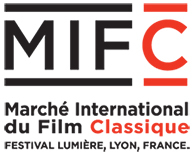Meeting with the Polish Film Institute about its ambitious restoration program, Digital Poland
Making your cinema exist and the status of your heritage films sustainable beyond your borders can sometimes be a complex task. And it's Poland's challenge, especially the Polish Film Institute's one, which works to preserve his classic films, societal and political cinema, which are sometimes lacking visibility and international influence.
Since 2003, the Institute has produced 40 feature films each year, while reviving the works of Polish masters such as Andrzej Wajda and Krzysztof Kieslowski, notably in impressive and prestigious boxes. But the institution is going to step up the pace thanks to a new restoration program, Digital Poland. An ambitious project launched this year and spread over 3 years with the aim of bringing out 160 films in restored copies.
The Polish Film Institute is not alone in this adventure. Accompanied by several partners, it works hand in hand with the National Archives. "We have at our disposal 4000 films, 10 000 documentaries and short films, 2000 animated and experimental films as well as 19 000 images of archives and audio recordings," explains Elzbieta Wysocka, Head of Film Restoration and Digital Repository at National Film Archives. Numerous gems, ready to be unearthed to find a second life thanks to the restoration process of the program Digital Poland.
Another partner in the digitization and restoration program is Tor Film Production. Her Film Restoration and Production Specialist, Joanna Lipinska, argues about the need for such a task: "Sometimes we lack digital material which makes it difficult to offer heritage films to the public despite a great demand from spectators."
The challenge is huge. And Poland is not at its first achievements in the field of heritage film restoration. Already, between 2010 and 2018, a previous digitization program had restored 30 films in 8 years. Agnieszka Kazubek, Digital Poland scheduler at the Polish Film Institute, explains the new approach: "The next step is to produce the same number of films, but in just three years, between 2018 and 2020. It's a difficult task because we do not have the support of the government but we are ready to tackle this project concretely. "
With a total operating fund around 26,000,000 euros, the Digital Poland program is based on co-financing, in which the European Union also contributes 84,63% or more than 18,000,000 euros. The contribution of the Polish Film Institute amounts to 3,000,000 euros knowing, for information, that the restoration and production of a heritage film unit is 80,000 euros.
|
RépondreTransférer
|



